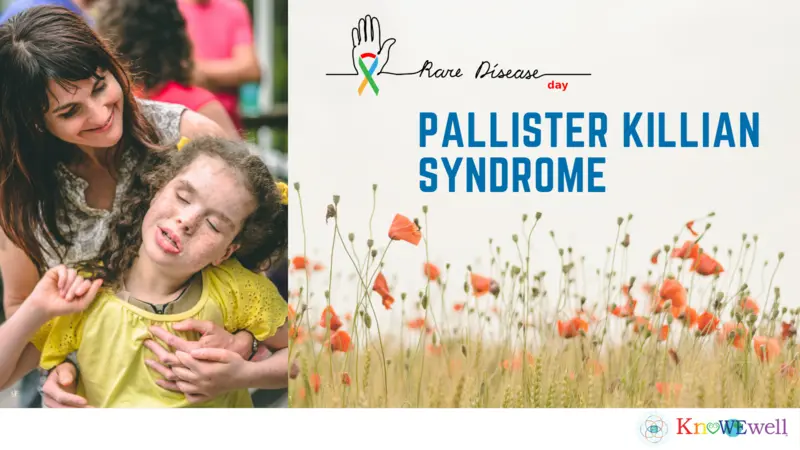

Inspirational

Inspirational
Pallister Killian Syndrome: An Often Undiagnosed Rare Genetic Disease
Rare Disease Day, on February 28th, brings attention to the rare genetic disorder Pallister Killian syndrome (PKS), which is misunderstood and often goes undiagnosed. Decades ago, genetic disorders were categorized under the label “mentally handicapped.” Many afflicted with mysterious syndromes were placed in institutions. Technological advances over the years have enabled the medical community to delve deeper and find minute chromosomal variations that distinguish between the different genetic disorders so patients and families can get the care and support they need.
The array of chromosomal abnormalities is vast, but what causes a genetic mutation is often a mystery. Exposure to toxins in the environment, parent illness before or at the time of conception, and advanced maternal age are just some factors that can contribute to the resulting genetic disorder. The delicate sequence of cellular division after conception can be interrupted by a number of factors. Although parents and medical professionals search for answers to why this happens, it is often impossible to know for sure.
What is known is that welcoming a newborn child with profound disabilities into the world is life-altering for families. The future is uncertain, the obstacles are great, and life can be overwhelming at times, but the rewards of parenting a child with special needs reach far beyond the diagnosis. The unconditional love and pure joy that these children radiate is infectious, melting even the most closed heart. And the depth of love that a parent of a child with special needs experiences is beyond description.
Welcoming a newborn child with profound disabilities into the world is life altering for families.
In 1947, when the door to the world of genetics was just being opened, Dr. Philip David Pallister, pediatrician and human geneticist, worked in an institution in Montana for the mentally handicapped, advocating for better care and treatment for residents. Many patients had undiagnosed disorders and Dr. Pallister used his knowledge of genetics to decipher the subtle differences with which each patient presented. His work drew many students, geneticists, surgeons, and medical professionals from around the world to the institution to learn what he was discovering about genetics.
By 1963, Dr. Pallister had partnered with Dr. Allen Miller to research chromosome analysis. At the time, two patients in the institution, one in his 30’s and another 16-year-old, shared many similar traits, including the now telltale sign of what was to be named Pallister Killian syndrome (PKS), an abnormality of chromosome 12 that produces duplicate short arms, causing profound cognitive and physical disabilities as well as medical challenges. These patients were the first to be diagnosed with the syndrome.
Today, only about 500 people in the world have been diagnosed with PKS, although doctors say there could be close to 2,000 cases in the US alone. Many go undiagnosed with this disorder since current methods of testing fall short. Researchers at the Children’s Hospital of the University of Philadelphia have continued Dr. Pallister’s work over the years with the help of an organization called PKS Kids, a nonprofit group of families of those with PKS who work tirelessly to raise funds for continued clinical studies and research.
Often, rare genetic disorders take months or years to diagnose, if at all. The limited clinical studies that have been done on PKS have concluded that the chromosomal abnormality is a “fluke” that happens spontaneously at conception. Humans are born with 46 chromosomes, 23 inherited from each parent. Those with PKS have 47 chromosomes in a varying percentage of their cells. PKS is considered mosaic, meaning not every cell in the body has the extra chromosome, which is made up of two copies of the short arm of chromosome 12 (tetrasomy 12p).
Those with PKS often have lifelong medical challenges, but the level of severity varies from child to child. Extremely weak muscle tone leads to a variety of developmental complications, including breathing and feeding difficulties. Many need to use a wheelchair and every movement they make takes enormous effort. Gross motor skills such as sitting, standing, and walking are often delayed or unachievable. Lax joints make those with the syndrome prone to congenital hip dislocations, so regular monitoring and bracing is required.
There are also significant cognitive delays and neurological issues associated with PKS. Other telltale signs include visual and hearing impairments, a high arched palate, sparse scalp hair often in the shape of a mohawk, extra nipples, enlarged tongue, diaphragmatic hernias, high forehead, broad nasal bridge, wide space between the eyes, and hypopigmentation. Many are prone to serious medical conditions that can be life threatening such as seizures, gastrointestinal issues, cardiac problems, and respiratory illness.
Consistent physical, occupational, and speech therapy, with the focus on functioning in daily life, enables those with PKS to have a much better quality of life. Using equipment such as a stander, which allows one to take weight through the legs, helps to strengthen bones. A gait trainer is a type of walker that also works to strengthen the muscles and bones of the legs. Prone mobile standers work to keep the person upright and allows them to develop upper body strength and move the stander with their arms. Much time is spent in a wheelchair, so being upright helps with a myriad of issues such as digestion, building up muscle and bone strength, and promoting overall good health.
Technological advances in communication devices have been a great help to those with PKS. Unable to speak or be understood, frustration results. Eye gaze technology allows the nonverbal, or those without the coordination to type on a keyboard, to communicate using their eyes. When they look at an object on a specially designed iPad mounted on their wheelchair, the computer speaks for them. Technology can replace what the disability has taken, filling in the pieces and helping the person function.
PKS children and adults have one very special trait in common—unconditional love.
Aside from PKS Kids, which has an active support system and bi-annual conferences, parents with children who have PKS form groups on social media. Parents of children with the syndrome are often the most effective researchers for this rare and misunderstood disorder. Visits to new doctors or specialists are sometimes spent educating the health professional about PKS. Parents gather data on their own and may pose a question on social media such as, “Do any of our PKS kids sweat?” A hundred comments later, a new fact about PKS is known—many with PKS do not sweat.
From Sweden to the United States to South America, PKS affects people across the globe, and the Internet has served to connect families. It is often within these groups that hope is found, frustration vented, and grief shared. Although the life expectancy for those with PKS can be normal, many of the associated medical conditions can be life threatening. When a family member with PKS falls ill, the community prays together. And when one succumbs to medical complications, everyone mourns.
Although the challenges and sacrifices of having a child with PKS are great, parents say it is all worth it. Every milestone is a celebration. PKS children and adults have one very special trait in common—unconditional love. Living each moment as it comes, those with PKS express themselves the best they know how, without shame or fear. Despite their physical and cognitive limitations, they live in the moment, treasuring every second they have with loved ones. These beautiful beings grace those around them with their presence and instinctively embrace what most of us take a lifetime striving to achieve—a fulfilled life of love, peace, and happiness no matter what.
REFERENCES
Children’s Hospital of Philadelphia. (n.d.) What is Pallister-Killian syndrome? https://www.chop.edu/conditions-diseases/pallister-killian-syndrome#:~:text=%20At%20The%20Children’s%20Hospital%20of%20Philadelphia%2C%20clinical,areas%20of%20the%20skin%20and%20compare...%20More%20
PKS Kids. (n.d.) Dr. Pallister. https://www.pkskids.com/copy-of-what-is-pks-2
PKS Kids. (n.d.) What is PKS? https://www.pkskids.com/copy-of-about-pks


 By
By







